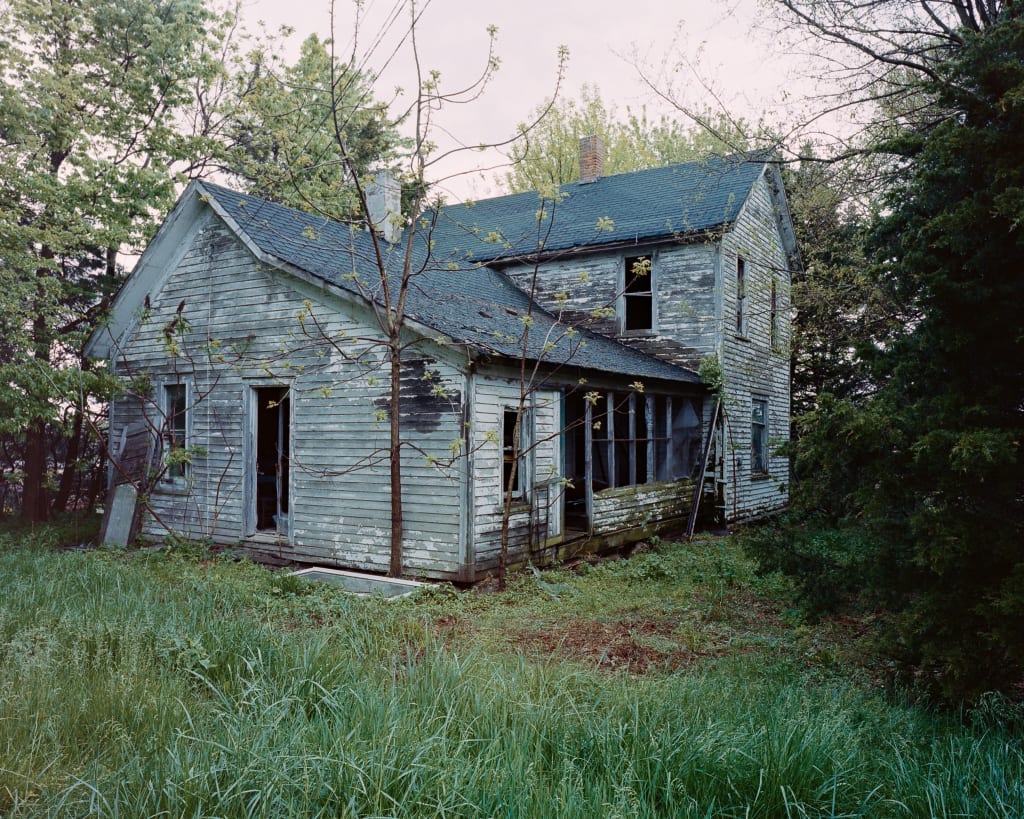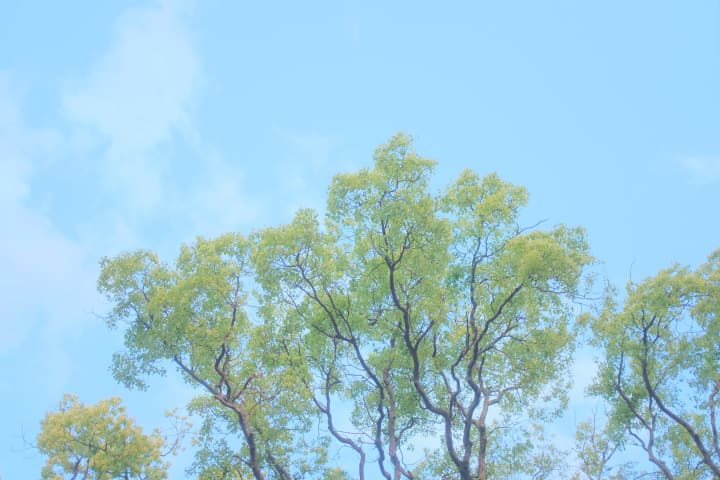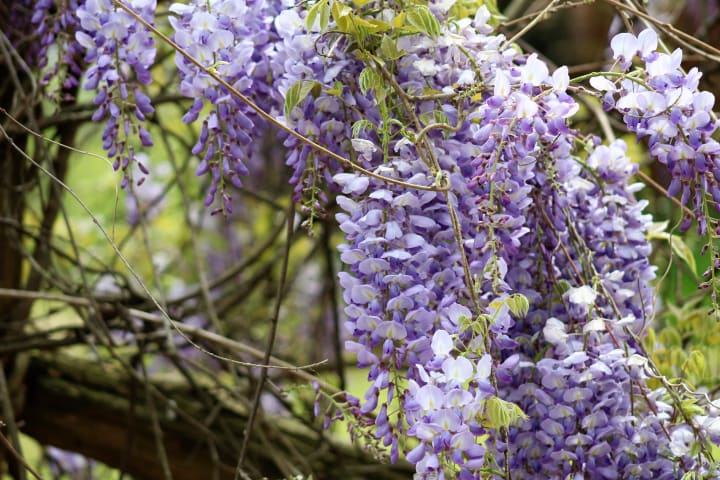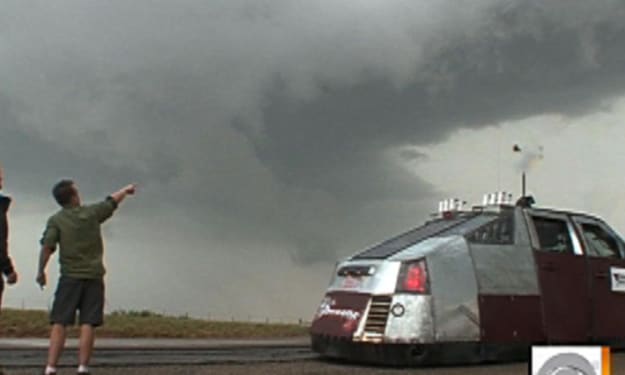Wisteria
A Short Story of Lessons Learned from Nature and Memory

I do not know why I ended up at the old farmhouse that day; I had just wanted to get out of the house for a while, so I went for a drive. I took turns at random, enjoying the fresh air, the warmth of the late April sun and before long I realized I was on the road that led past the cemetery. It looked so peaceful through the iron fence, the large old trees and green grass, a small pond in the center with white ducks and swans, but I was not ready to go back there, not yet. It was just too soon.
So, I went right past the big entrance gate and kept driving, lost in memory I guess and not paying attention to where I was going. Without intending to, I got in the lane that entered the highway headed south and found myself not far from the old farm where I had lived when I was a child. I had not been back there since my family had moved from it almost twenty years before and really did not have any reason to go back now. But since I was already so close, I turned onto the road that led past the farm; it was not like I had anywhere else I had to be.
∞ ∞ ∞
My father did not care for the schools we attended in town, so he moved us to the farm when I was 10 years old. It was an old house on a farm that my great grandfather owned but he no longer lived in the farmhouse, which had been empty for several years and everything had grown wild. What had been the yard was now waist high grass and weeds, and where there had once been a vegetable garden grew a briar patch. Mom was not happy about moving there, but we cleaned the yard up good with swing-blades and the lawn mower, starting along the front porch where Mom wanted to plant flowers. Dad said it would be a real yard by the next year, and it was, or close enough for mom. But she wanted a vegetable garden too, and the best place for that was where the briar patch had grown. And that was my job alone- to get that area ready for planting.
I took the swing-blade to the weeds and briars, then cut it all lower with the lawn mower and then raked everything into the woods behind the field. Then came the hard part: dig and turn the soil and get the roots out. Dad had a garden tiller but would not let me use it even though I knew how; he said I might hurt myself with it. Instead, I used a shovel that had a handle as tall as me. The ground was not too hard; being shaded by the briars and weeds had kept it damp. I would put the shovel tip on the ground, grasp the handle with both hands, kick the shoulder of the shovel blade to get it started and then jump on it with all my weight. That usually worked and I could turn over a few shovelfuls and then work the cut roots out of the soil. There was something satisfying about clearing the ground and the smell of damp, rich black soil, so the work really was not too bad.
But occasionally I would jump on the shoulder of the blade and the shovel point would hit a rock, or mat of roots too hard to cut through. When that happened, I would feel the jolt through my feet and the handle would vibrate as the shovel twisted from beneath me and fell to the side. I almost always got one foot back on the ground for balance, but sometimes I just fell over with the shovel to where pieces of the briars I had cut up with the lawn mower. But after a week or so I was finished, the ground was ready, and mom planted her vegetable garden in the late spring.
There was an unused well near the garden with an old, iron, single-handle pump and I used that to water the garden. The pump was the lift handle type, but it was so old that the seal had rotted so the pump had to be primed before each use; for that I always kept a full bucket by the well to get the water flowing and then used the bucket to water the garden, carrying a bucket at a time then returning to the well to pump another bucket full. The last bucket I filled I left by the well to get the pump primed the next time. Dad joked that I was the “running water” for the garden because no matter how careful I was water always splashed from the bucket onto my jeans.
∞ ∞ ∞
As I turned down the dirt lane in front of the farm, I remembered digging that garden though I had not really thought about it in years. I stopped in front of the sycamore trees, got out of the car, looked over at the old well and then past it; that iron pump was still there but the vegetable patch had gone back to briars and the whole yard was weed-filled. The house looked like no one had lived there since we had moved. Even the brick chimney had a crack running down it where the ground below had sunk. And where mom’s flowers had grown along the front porch, there were now just weeds.
There was a row of huge sycamore trees in front of the house, so I walked over to one and stepped up onto one of the large roots that grew on top of the ground. When we had first moved there, I had thought they were the biggest trees I had ever seen, and even after I had grown up, they seemed as large as I remembered them. The thinnest trunk was about foot feet across; the largest was probably more than five feet in diameter.

Dad had said they were probably eighty feet tall, and after seeing them from a distance as I had come up the lane, I thought that he was right.
A lot of the darker bark was peeling back, the way that sycamores do, and splotches of new white bark showed through. Dad had also told us the sycamores were older than this farmhouse; the original house had burned down in the 19th century, but the trees had not burned, and Poppa had built this house right where the old one had been.
Dead leaves crunched under my feet as I walked around to the back of the house. I stood by the back corner for a few minutes, just looking around at what had been the back yard, the tree branch that had held the rope swing, the little grassy space by the woods where I had played, and where leaves had now piled up for years. Since the trees were just beginning to show new leaves, more light reached the ground than in summer when a dense green canopy shaded the yard and I saw a few broken beer bottles among the dried leaves; hunters, I guessed. A few broken shards of glass hung from the frame of my old bedroom window and much of the paint had worn off the house, leaving gray weatherboard exposed. There were holes in the weatherboard on the side of the house that faced the big field; buckshot from deer hunters who no longer had to worry about anyone living in the house. Most of the other windows were broken out as well and the house sagged where rain had blown in for years. No one would be rebuilding this place, I thought as I turned to go back to the car.
And that is when I saw it.
When we had moved to the farm and started clearing the yard, I came across the trunk of a small tree near the edge of the woods behind the house. My uncle had already cut down small trees and cleared out brush where what would be our yard ended at the woods behind the house but had missed that one. It was about six inches diameter and maybe two feet tall, and a few branches that had grown up above it. And those branches sprouted numerous thin bare branches that arched up and then curved downward. To cut it down I would need the chainsaw and knew dad would not let me use that, so I got him to look at it.
When mom saw it, she said it was a wisteria and insisted dad leave it there. I cleared the weeds from around its trunk so mom could get a closer look. It was an old one, she had said, that had been cut off at that height and shaped into a small tree. It bloomed later that spring, and every year after, with pendulous clusters of lilac-colored flowers hanging from its still bare branches; a fountain of color before its leaves even grew. But the year before we moved away, my uncle was again helping clear brush along the edge of the yard. He thought he was helping, but he cut down the dormant wisteria to the ground with his chainsaw. He had no way of knowing it was not just some of the brush that needed to be cleared. Mom had loved that wisteria, and she cried when dad told her what had happened.

But the wisteria, being a vine by nature, had sent out runners in every direction and now it climbed high into the oaks, pines, and other trees behind the house, reaching out towards the sun, pendulous flower clusters hanging from bare, arching branches. It was more beautiful now than it had ever been when it had been pruned into a tree form and I realized then that even after being cut down, that wisteria had not given up; it had not died.
I walked back to the car then, feeling better, somehow, and headed back home.
“Great I call the elusive. The elusive I call the far. The far I call the returning.”
***
This story was originally posted on Medium.
Thank you for reading this short piece and I hope you enjoyed it. I have other stories and poetry written and more to write, along with my thoughts on issues of the day, spirituality, religion, politics, and more. You can subscribe to Vocal using my link and see all new work as I publish it and you can also read the thoughts, stories, and viewpoints shared by thousands of writers. And part of the money from every membership helps us all continue to publish and share our work.
I can also be found on Medium, Simily, Twitter, Facebook, and LinkedIn.
I hope you enjoy my work, and a small tip will help me to continue writing.
About the Creator
Blaine Coleman
I enjoy a quiet retirement with my life partner and our three dogs.
It is the little joys in life that matter.
I write fiction and some nonfiction.
A student of life, the flow of the Tao leads me on this plane of existence.
Spirit is Life.






Comments
There are no comments for this story
Be the first to respond and start the conversation.